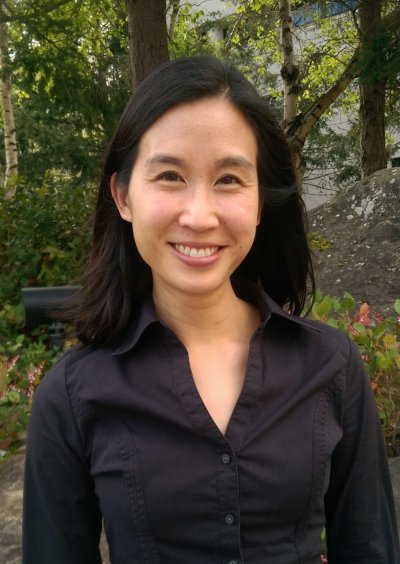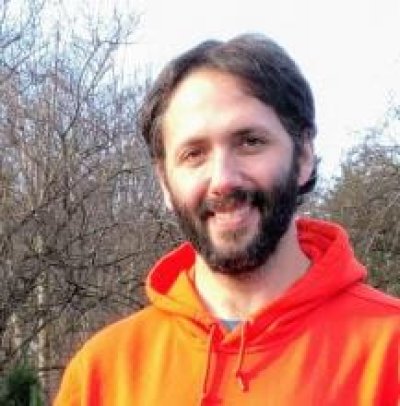Biology faculty reel in two more prestigious CAREER grants from the NSF
Two Western biology assistant professors, Suzanne Lee and Nick Galati, were recently awarded National Science Foundation CAREER grants, the foundation’s most prestigious award in support of early-career faculty. Lee and Galati received $1,254,671 and $908,007 grants, respectively, to continue their research efforts and support student learning in the molecular biosciences.
Lee’s grant will support the student-driven research conducted in Lee’s lab, which currently focuses on a cellular pathway that produces small non-protein coding RNAs that appear to protect DNA genomes from damage. This kind of process is critical to the maintenance of cellular health and may be widely conserved among diverse eukaryotes, ranging from humans to the single-celled organism Tetrahymena thermophila that Lee’s lab uses as an experimental model.
"Protection of our genomes from mutation and DNA damage is critical for sustaining life and preventing disease," Lee said. "I’m beyond delighted and very excited to see what my lab and our collaborators are able to uncover as we pursue our research plan."
Funding from Lee’s grant will also partially support summer programming for Western undergraduate researchers in the Biology Department and advance collaborations between her lab and course-based research experiences (CUREs) taught by herself and her colleagues at a number of primarily undergraduate institutions in the Northwest US, including Western. WWU’s Director of STEM Education Research and Evaluation, Dan Hanley, will collaborate with Lee in evaluating the impacts of these educational efforts on students and faculty alike.
While Lee now enthusiastically identifies as a molecular cell biologist and biochemist, she said she didn’t always feel that way. She grew up attending an inner city, public high school in the Midwest where biology involved the use of chipped and broken test tubes, dissection of reused fetal pigs, and a lot of rote memorization. Her turning point happened in college, when she met an organic chemistry professor-turned-mentor who sparked an interest in “how things work” in living organisms and started doing research, first in her mentor’s organic chemistry lab and then in others’ molecular biology labs.
According to Lee, this opened her eyes to what one does as a biological scientist – “actively investigate yet-unsolved mysteries in (cellular) life”. Because getting involved in research was so transformative to her own career trajectory, “I’m extremely thrilled to have the opportunity to strengthen and expand research training opportunities for our undergraduate and Masters students at Western,” Lee said.
Similar to Lee, getting exposed to research was a key event that put Galati on a path to becoming a college professor.
“As a college student, I had a hard time getting excited about textbook information. I wasn’t really enthusiastic about cell and molecular biology until I “lucked” my way into a research job post-graduation,” Galati said.
“Once I started doing research, I lost myself in the complexity of how cells work. I was a first-generation college student with loans piling up and financial pressure from all angles. Research has been an escape and a gateway to understanding cell biology. This grant gives me the freedom to both answer some new scientific questions and expose the next-generation of students to research,” Galati said.
Galati’s NSF CAREER grant will support an integration of microscopy-based research on hair-like structures called cilia and research-based outreach to aspiring first-generation college students from Mount Vernon High School. Scientifically, the Galati lab investigates dynamic events that underlie the formation and function of cilia, which are evolutionarily ancient organelles that provide propulsion and sensation at the cellular scale. With respect to propulsion, Galati is using Tetrahymena to understand how cilia are positioned across the cell surface to maximize flow. With respect to sensation, Galati is working with professor of mathematics, Tilmann Glimm, to develop cilia microscopy data into a predictive model to explain how cilia sense embryonic signals via calcium ions.
Beyond cilia research, Galati plans to spend his summers working with a longitudinal cohort of aspiring first-generation college students.
"Faculty-led summer STEM research experiences can enhance 1st-gen STEM success, which creates a need for high-impact K-12 STEM research mentors," he said. By supporting aspiring first-gen students with paid lab research experiences and college preparedness training, Galati expects the team to make a major contribution towards diversifying the skills and backgrounds of the future STEM workforce.
“I hope to use the expertise of the Galati lab to show these students that cell biology research is exciting and, ultimately, to make sure they understand how to chart a path to college,” he said.
Lee said she was thrilled that she and Galati received their grants together.
“Both of us receiving these grants simultaneously in the Biology Department is such a delight and an honor”, said Lee.
Though Galati and Lee run separate research programs in the Biology Department, both are molecular cell biologists who have collaborated in a number of ways: through CUREs, though co-advising of student researchers, and Galati himself made major microscopy contributions to work led by Lee’s undergraduate researchers that was published last year in "Molecular Biology of the Cell." Their collaboration even extended to their drafting their respective NSF CAREER proposals, where they held bi-weekly check ins to bounce ideas off of one another and generally commiserate and cheer each other on.
Brad Johnson, dean of Western's College of Science and Engineering, said the university receiving two more CAREER grants is indicative of the quality of the University's teacher-scholars.
"We are incredibly proud of Suzanne and Nick; these prestigious awards are well-deserved, and will serve to move the college forward in our mission to provide undergraduate students with high-impact, genuine opportunities to participate in best-in-class research," he said. "Indeed, these are just the two most recent examples of the broad excellence of the faculty in the College of Science and Engineering."

